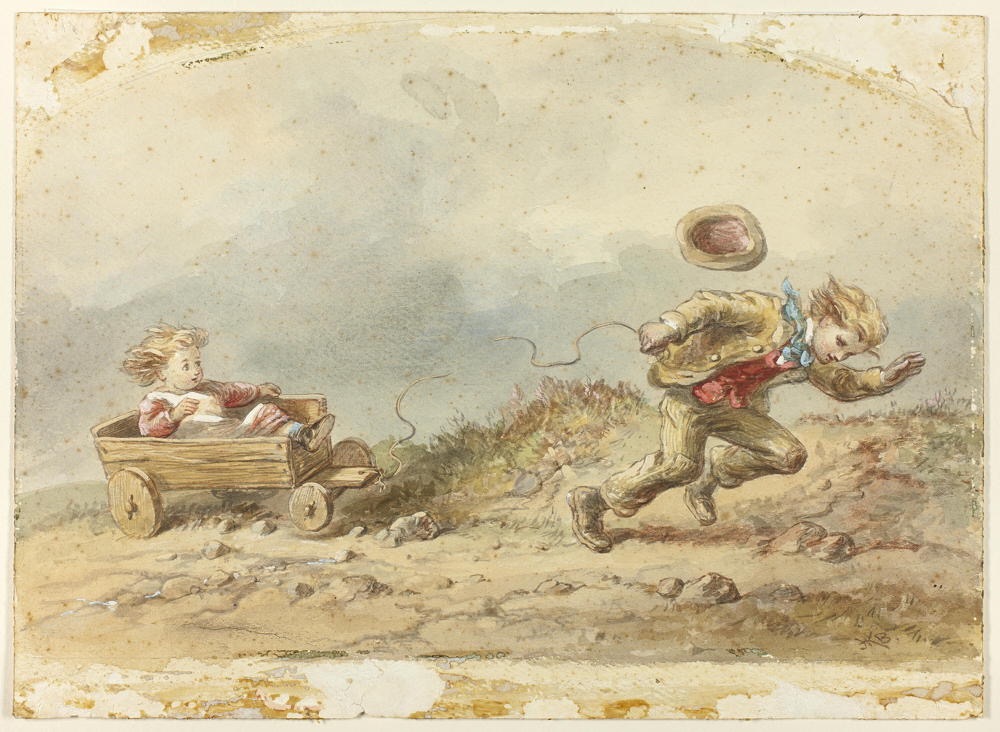ZombieLand

Hablot Knight Browne:
The Broken Cart-Rope
(n.d.-mid-nineteenth century)
Just before the 1929 market crash, economist John Maynard Keynes predicted that his grandchildren would, a hundred years hence, inhabit a world requiring them to work no more than fifteen hours per week. Even then, he insisted that fifteen hours would provide more labor than the economy would strictly need to effectively operate. We easily notice today that this prediction has yet to come to fruition, though we might notice too easily and miss seeing what's happening around us. Yes, most report ever-growing pressure to work ever more hours. Yes, overwork has developed somewhat of a cachet, a status symbol such that those who work the most believe themselves to be the most essential. Yes, everyone complains about their lack of leisure time, but I'm curious if leisure means what it meant back in 1929 when Keynes published his prediction.
Leisure time then didn't include a minute of cell phone time. He characterized it as more family and recreational time, pursuits that perhaps we might choose were our handheld devices outside our attention queue. When the "What to do?" question arrives, as it must to anyone not already immersed in some scheduled obligation, how does the modern respond? Most, I garner, would never respond. Many never even ask that sort of question. The question need not get asked because some app's already enqueued and ready for execution. An idle moment requires no contemplation. It's earned a knee-jerk reaction. I spend my idle moments checking to confirm that my handheld holds sufficient charge to support whatever might come up next.
While there, I will take an abbreviated tour around the stations of my cross, what some might characterize as my technological double cross, to see what's been happening while I was distracted working my fifty-hour schedule. Dollars to doughnuts, I will not be accounting for that brief excursion as a diversion from my work. It will have seemed like no more than an idle second, though a disconnected observer might have counted more than an idle second expended there. I entered a time warp, a time quite literally out of serial time, where clockwork materially misrepresents whatever happens. I check the usage stats on my handheld and feel astounded. Who's been burning up my hours while I've been laboring more than those predicted fifteen hours?
The likely answer to that discomfiting question should be, "Me!" Not the me I knew before the advent of handheld devices, but the newer me, the one I hadn't noticed myself becoming under their influence—the one who inhabits a ZombieLand outside of regular time. The one often mesmerized by something that once would have seemed so damned trivial as to seem eminently ignorable, something certainly beneath the cultured me and far below my previous standards; somebody else inhabiting my body for an increasing number of hours I rarely notice slipping past.
From my observation point overlooking The Center of the Universe, I watch early mornings arrive. It's always still dark outside when I first take to my perch. As light starts emerging, dog walkers pass. On Sunday mornings, newspaper carriers come, reminding me of myself in my youth, except these modern ones do not seem to be working as they pass. When I delivered papers, I maintained a laser-like focus on my business. I challenged myself to finish in record time every morning, so I moved with disciplined swiftness lest idleness undermine my efforts. My modern paperboy doesn't seem to be paying attention. He's holding something at half arm’s length in front of his face. I worry that he might stumble on a curb or get run over crossing the street. He moves so slowly that he takes forever to pass, his newspaper bags draped over his shoulders like a serape filled with flat papers. Almost an hour later, he passes again, empty serape flapping, still following his handheld north star to wherever he was heading, probably home.
How should I account for his work, which seemed to have occurred while he was in absentia, floating in ZombieLand or somewhere? Had I witnessed the successful melding of laboring and leisure such that Keynes' prediction no longer carries any referent? I fondly remember my adventures delivering newspapers, for they occurred in a rich world of stray dogs and miss-thrown papers. I could write a novel as thrilling as any mystery, I imagine, about those times before school when I was in charge and engaging out in the world. I imagine our post-modern counterpart missing his adventures, for he seemed pre-distracted, not nearly present enough to experience anything more than what I suspect were compelling Tic-Tok® videos. He prefaces a ZombieLand, which might represent the future of labor, where leisure and labor so seamlessly interact that we no longer experience that longing for time away from our professions while we so invisibly slip in and out that nobody hardly notices our passages, not even ourselves.
©2023 by David A. Schmaltz - all rights reserved


